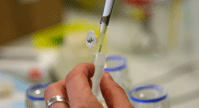Cocoa (French Bulldog Chocolate)
Description:
Variants in the TYRP1 gene, or B locus, are the most common cause of brown, chocolate or liver coat color. There are currently a total of five known TYRP1 gene mutations that impact the genes functionality, explaining the majority of dogs with brown coat and nose color. One exception is the brown or chocolate French bulldog, which remained a mystery as to the cause. In 2014 Animal Genetics sequenced the TYRP1 gene of several brown French bulldogs but was not able to find any functional variants that corresponded to brown coat color, eliminating the TYRP1 gene as the primary cause of French Bulldog chocolate. Recently, research conducted in University of Bern in Switzerland revealed a nonsense variant in HPS3, c.2420G>A or p.(Trp807*). In this study, the brown or chocolate dog was homozygous for the mutant allele.
Animal Genetics conducted whole genome sequencing on 3 brown or chocolate French bulldogs, 2 negative for all TYRP1 allele mutations and one brown dog that carried one copy of the recessive form of a TYRP1 variant. Our research showed the same correlation between the recessive HPS3 allele and the phenotypical look of the dog. Further research will have to be done to determine additional relationships between the HPS3 variant and other genes.
Differences in coat, skin and eye color between TYRP1 and HPS3 homozygosis dogs are subtle but clear with two copies of cocoa having a slightly darker coat color and lighter eyes than the more common TYRP1 related brown dogs.
Cocoa Testing:
Animal Genetics currently offers a test for the Cocoa to determine how many copies of the recessive "co" allele a dog carries. Dogs can be DNA tested at ANY age.
Sample Type:
Animal Genetics accepts buccal swab, blood, and dewclaw samples for testing. Sample collection kits are available and can be ordered at Canine Test Now.
Testing Is Relevant For The Following Breeds:
French Bulldogs and possibly other breeds.
Results:
Animal Genetics offers DNA testing for HPS3 allele. The genetic test verifies the presence of the mutation and presents results as one of the following:
* Additional causes of this trait exist. A negative result for this mutation does not eliminate the possibility that an additional, yet unidentified mutation or mutations in the genome may lead to a similar trait.
n/co-Allele Results:
| n/n | Black | The dog is negative for the HPS3 gene mutation. In most cases the dog will express black pigment rather than chocolate, and will always pass on the "n" allele to any potential offspring. |
| n/co | Black | Both the dominant and recessive copies of the HPS3 allele are present. In most cases the dog will express black pigment rather than brown, but carries the allele responsible for the chocolate phenotype. The dog can pass on either allele to potential offspring. |
| co/co | Brown | Two copies of the recessive HPS3 allele are present. In most cases the dog will expresschocolate pigment rather than black, as well as a brown nose and foot pads. The dog will always pass on the recessive "co" allele to all potential offspring. |
Submit a Sample for Testing:
To submit a sample for testing please go to Canine Test Now.
To order a sample collection kit please go to Order Sample Collection kits.
Cost per sample is - Call. Please see our Canine Fee Schedule for all test rates.










